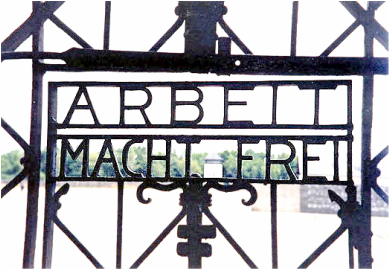|
A series on issues that beg the question.
Jodi Bruhn| June 29, 2015
Munich, 1933: The good bureaucrat, Josef Hartinger.
This excerpt is based on a full-length book review that appeared in June 2015 in Law and Liberty.
Five months after Germany’s last free election of the interwar period—the National Socialists’ March 5, 1933 victory with 44 percent of the popular vote—a law was passed quashing criminal investigations of members of the National Socialist government. It took less than half a year to reorient the organs of the Bavarian bureaucracy to the National Socialist agenda. Pivotal to this process was Dachau. The former gunpowder factory in this artists’ town just north of Munich was converted 15 days after the election into a concentration camp for Bavaria’s thousands of political prisoners. The camp served as a container for persons in “protective custody”—and as a threat to the rest. By May, its intended effect had been achieved. “Dear Lord, O make me dumb,” went a bedside prayer of the time, “Lest to Dachau camp I come!”
In Hitler’s First Victims: The Quest for Justice, historian Timothy W. Ryback presents a meticulously researched but also highly readable “micro-history” of the Dachau camp. A kind of forensic reconstruction based largely on archival sources, it retraces the Bavarian predilection for political violence from 1919 to 1933, the lives and the violent deaths of the camp’s first victims, and the dogged attempt by Josef Hartinger, a mid-level prosecutor within the Bavarian Ministry of Justice, to prosecute a homicide case against the camp’s SS overseers. The original contribution of Hitler’s First Victims is its record of the efforts of Munich II prosecutor Joseph Hartinger, assisted by Munich II medical examiner Moritz Flamm, to prosecute the early Dachau killings as homicides under Bavaria’s criminal code. Hartinger’s goal was to obtain a conviction for a chain-of-command order for the multiple murders that had occurred in the first weeks of the camp’s operation. In Hartinger, we find a kind of anti-type to the National Socialist bureaucrat of Hannah Arendt’s 1963 book, Eichmann in Jerusalem. Ryback portrays a human being who was ordinary—but by no means banal. This career civil servant lived comfortably. A Bavarian Catholic, he had a wife, a five-year-old, and good career prospects. In contrast to Adolf Eichmann, Hartinger was a gifted and competent lawyer. He had also demonstrated courage in the First World War, and pugnacity in his legal prosecutions. Despite the danger to his person and the hesitation of his superiors, Hartinger showed both fastidious professionalism and moral courage in building his case against the murderers at Dachau. The indictment papers he prepared became instrumental in building the case against senior SS members in the Nuremburg Trials. This is a well-written and well-researched book, a vivid contribution to our understanding of all that went wrong in Germany those months in 1933. Above all, its portrayal of Hartinger’s actions compels us to reflect on the moral and professional virtues that characterize excellence in a public official. And yet one must still take issue with the book's central point. Ryback writes that his intention is to “demonstrate that if Germany had found more individuals like Hartinger, perhaps history could have been set on a different, less horrific path.” His point that the German Sonderweg was not inexorable is well taken. On the other hand, his own narrative suggests that it would have taken hundreds of thousands of courageous individuals, and further, by 1933, that those individuals would have had to engage in active civil war rather than documenting Nazi crimes as they unfolded. “I was only doing what my sense of duty and my professional oath demanded.” Thus spoke Hartinger when he later dismissed efforts to honor him for his work in 1933. The good bureaucrat. But in 1933, the dutiful upholder of the Weimar Constitution was already being replaced by another type. Under the National Socialist regime, as Arendt ably demonstrated in her Eichmann book, the defender of constitutional democracy had to resort to means not simply outside of but against the totalitarian state. And it is clear from this portrayal that Hartinger, who later also served in the Second World War on the German side, was unwilling to go there. One ought not dismiss the significance of his efforts against the Dachau murders—but one shouldn’t overstate it, either. Full article: http://www.libertylawsite.org/book-review/munich-1933-the-good-bureaucrat-josef-hartinger/ |
Posts in the SeriesJune 2024
The arc of a viral panic: a book review May 2020 Indigenous women to the barricades: a book review September 2017 Indigenous rights are human rights: a reminder from Argentina March 2017 On surfing and strawberry tea: how your spring break could promote reconciliation September 2016 The right guy at the right time: Gord Downie's contribution to reconciliation Janvier 2016 Encore une Commission... June 2015 Munich, 1933: The good bureaucrat, Josef Hartinger November 2014 Addressing the language of the Aboriginal/settler relationship June 2014 From big to better data through indigenous data governance January 2014 Toast to those who showed courage in public life October 2013 Excellence is everywhere: Blueprint 2020 and the future of the public service April 2013 Time to investigate options for resource revenue sharing December 2012 Speaking of accountability: examining the relationship of First Nation voters to their governments About the AuthorJodi Bruhn (PhD, Notre Dame) is a published policy researcher, author and facilitator who conducted PhD research at the University of Munich in Germany. She is director of Stratéjuste Canada.
|
Stratéjuste
|
WHAT our clients have said
|


